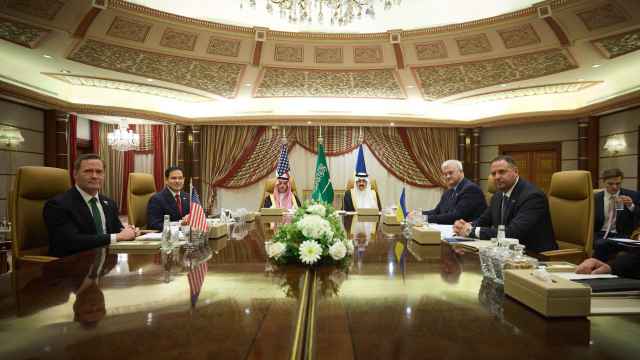LONDON — Gazprom has not yet satisfied the European Commission's concerns over pricing and the European Union's executive body may still charge the state-controlled Russian gas monopoly with antitrust abuses, the EU competition chief said on Friday.
The world's top gas producer and the supplier of a quarter of Europe's gas needs, has been under EU investigation since September 2012 for suspected anti-competitive behavior, including overcharging customers and blocking rival suppliers.
Gazprom said last month that it was keen to settle the 17-month EU antitrust investigation but would resist regulatory pressure to change its pricing practices in eastern Europe.
Ukrainian President Viktor Yanukovych's decision in November to deepen trade ties with Russia rather than the EU, which has led to months of violent street protests, may complicate the talks.
Disputes over gas pricing between Russia and Ukraine — through which Gazprom pumps the bulk of its gas to Europe — caused shortages in the region over the winter of 2009.
Gazprom has offered the EU pricing concessions but has not unveiled the details and may have to sweeten its offer to ward off a possible fine of as much as $14.3 billion or 10 percent of its 2012 turnover.
Almunia told reporters on Friday he met with Gazprom and Russian Federation representatives in Brussels before Christmas and noted progress on securing commitments regarding two of three EU concerns.
Gazprom conveyed the possibility of making proposals to settle the investigation to avoid Brussels going to the next stage and deciding whether to fine the company, Almunia said.
The EU is concerned that Gazprom could be fragmenting the EU's internal market, including possible anti-competitive elements in contracts, and carrying out potential abuses of indexation for pricing gas.
"We have received good comments on two of the three concerns that can give way to formal commitments but on prices we have not yet received what we need," Almunia said.
"So we continue drafting the statement of objections that can be adopted in coming months. If in the meantime, before the adoption … we receive proposals that are good enough to eliminate our concerns then we can go to the commitment decision," he said.
A statement of objections refers to the stage in an investigation by formally setting out the EU's concerns.
"I want to be clear that we are not stopped in the preparation of a statement of objections because we have not received what we want," Almunia said.
Gazprom's deputy chairman Alexander Medvedev said progress had been made and that the company had addressed the Commission's concerns.
"The factual evidence we have presented does not support the Commission's concern about alleged excessive pricing in some eastern European markets," he said.
"We are currently working on presenting further evidence to answer the Commission's questions in order to hopefully reach a satisfactory compromise," a statement issued in Brussels said.
A Message from The Moscow Times:
Dear readers,
We are facing unprecedented challenges. Russia's Prosecutor General's Office has designated The Moscow Times as an "undesirable" organization, criminalizing our work and putting our staff at risk of prosecution. This follows our earlier unjust labeling as a "foreign agent."
These actions are direct attempts to silence independent journalism in Russia. The authorities claim our work "discredits the decisions of the Russian leadership." We see things differently: we strive to provide accurate, unbiased reporting on Russia.
We, the journalists of The Moscow Times, refuse to be silenced. But to continue our work, we need your help.
Your support, no matter how small, makes a world of difference. If you can, please support us monthly starting from just $2. It's quick to set up, and every contribution makes a significant impact.
By supporting The Moscow Times, you're defending open, independent journalism in the face of repression. Thank you for standing with us.
Remind me later.





